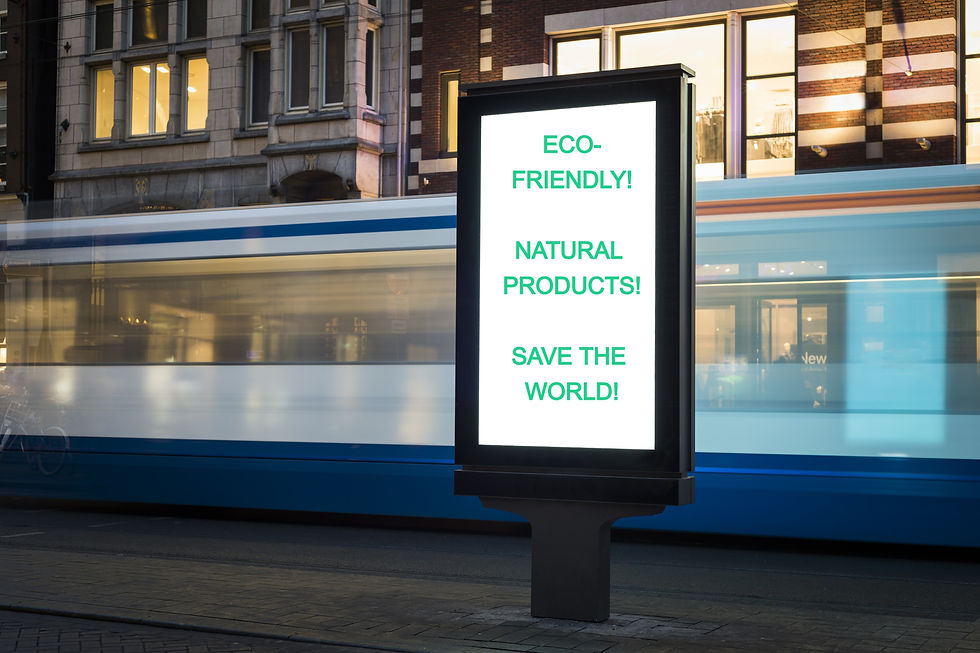Damning report reveals high incidence of greenwashing in eco-marketing
- Andrew Byrne
- Jan 29, 2021
- 2 min read

A damning report just published – 28th January – indicates that the level of misinformation issued by companies about their environmental credentials is alarmingly high.
The International Consumer Protection Enforcement Network (ICPEN) conducts an annual “sweep” of websites to identify fraudulent, deceptive or unfair conduct. This year, they included greenwashing (false claims of acting in the environment’s interest) among their investigations and found that 42% of the claims made were exaggerated.
The sweep was conducted by the UK Government’s Competitions & Markets Authority (CMA) and their Dutch counterparts, the Netherlands Authority for Consumers & Markets (ACM). The review has taken in the websites of 495 companies – 1,095 will be looked at in total – across all sectors of the economy.
The findings revealed that:
Vague claims and unclear references to “eco” or “sustainable” or “natural products” were unaccompanied by evidence to their origin.
Companies included their own-brand eco logos and labels which were not associated with accredited organisations.
Websites omitted details of a product’s pollution levels.
CMA estimates are that UK consumers spent £41bn annually on ethical goods and services in 2019 – a four-fold increase during the last two decades. Concern is expressed that outlay of this magnitude on products with false claims to their ecological value will ultimately be damaging to attempts to meet decarbonisation targets.
The CMA also voiced a worry that some businesses could be incentivised to make misleading, vague or false claims about the environmental impact of their goods and services to gain access to this lucrative market.
In the ACM’s report on their findings, a list of five rules for honest sustainability claims is provided. The list includes clarity on the product’s sustainable benefit; factual evidence of claims made; comparisons with similar products; transparency on the company’s sustainable actions and no ambiguity on claims made or labels used.
The European Commission has empowered national authorities to contact the companies concerned about the issues detected and to rectify them where necessary. The findings will be incorporated into a New Consumer Agenda which will allow consumers to participate in “the green and digital transition”.
A statement issued by the CMA lists the markets within the scope of their review which encompass agriculture, construction, clothing and fashion, electronics, food manufacturing, household goods, textiles, furniture and others.
It is pertinent to remember the genesis of the term in the 1980s when the environmental activist, Jay Westerveld, realised the policy of a hotel he visited which asked guests to reuse towels to “save the environment” was at odds with other actions taken by the hotel. He concluded that the request was merely to reduce their costs and labelled the action as “greenwashing”.
Futerra, the sustainability strategy and creative agency, published a report in 2015 which suggested that greenwashing was often the result of “over-enthusiasm” in trying to apply a green sheen to products or services. This is redolent of a less cut-throat world than is probably the case but the hope is that the ICPEN’s findings will result in the installation of credibility into companies’ environmental claims.





![LOGOTYPE [GREEN_DARK GREEN].png](https://static.wixstatic.com/media/d6e0b6_7c15be730f2c42d4ad22da5f1e69fa35~mv2.png/v1/fill/w_877,h_198,al_c,q_85,usm_0.66_1.00_0.01,enc_avif,quality_auto/LOGOTYPE%20%5BGREEN_DARK%20GREEN%5D.png)



Comments